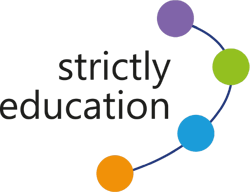
The Governance of Inclusion
Thursday 29 February 2024
This free online event showcases governance, celebrates commitment and enhances recruitment of new governors. Your free digital pass enables you to access all sessions throughout the day. If you have any questions about the event, click here to email us.
Our exciting programme of events, throughout the day will focus on the governance of inclusion in 2024. We will explore, with our expert speakers, key aspects of education and school life where governance has a role to play in ensuring that their school or trust is inclusive of all, embracing the diversity of its community, delivering equality and equity for all.
Programme

Welcome & The Governance of Inclusion in 2024
8am
Steve Barker
This session will explore crucial themes of equality, equity, diversity, and inclusion in school governance. Gain valuable insights from a leading school governance expert and be sure to submit your questions to Steve to enhance your understanding of inclusive governance.

How do governors ensure inclusivity in staffing?
9.30am
Titi Olusanya
Strictly Education HR Consultant
Kirstie Young
Strictly Education Senior HR Consultant
Governors plays a vital role in ensuring oversight and scrutiny of the equality, diversity and inclusion strategy, policy, procedures and practice. However, with wellbeing a major consideration, governors have a significant responsibility to ensure that staff in their schools and trusts are respected and appreciated as valuable members of the school community. The session will explore what an inclusive culture is and how governors should question leaders, in order to advance and embed inclusion

Supporting SEN
11am
Viv Trask-Hall
Head of Product and Innovation, Thrive Approach
Out of the 1.5 million pupils with SEN, only 25% have an Education, Health, and Care (EHC) plan. Join Thrive's Viv Trask-Hall for ‘Supporting SEN: Your strategies for inclusive classroom practice’ as invaluable insights and practical tips for governors are shared, to support children with varying needs and abilities in the classroom.

Keynote address - How should governance navigate inclusion in 2024?
12.30pm
Fiona Millar
Chair of Governors & Education and Parenting Writer for The Guardian
As patron of the National Association for Special Educational Needs, Fiona’s commentary on inclusivity will be enlightening and forward-thinking. We invite you to join us for this special lunchtime session.

Ensuring inclusion of LGBTQ+
2pm
Ian Timbrell
Consultant, Timbrell Education
An illuminating webinar Ensuring Inclusion of LGBTQ+, to explore vital strategies for creating safe and supportive environments for the LGBTQ+ community in the education sector. Discover practical approaches, professional development resources, and policy recommendations to support inclusivity in schools.

What does an Inclusive School look like in 2024?
3.30pm
Katie Aldred
Headteacher, Bagshot Infant School
This session will feature inputs from two very different schools, both showcasing how inclusion reflects the diversity of their setting.
Bagshot Infant School Headteacher, Katie Aldred, will focus on how her school has inclusion at its heart and uses this to; inspire the design of its curriculum, shape its Nurture provision, guide the provision of Emotional Literacy Support Assistant (ELSA) and has developed outside learning to include Forest School, an environmental area and an award winning school garden.

How inclusive is your governing board?
5pm
Hannah Stolton
CEO, Governors for Schools
Olivia Hinds
Brand and Digital Marketing Manager, Governors for Schools
Ellie Cheshire
General Manager, GovernorHub
Vinny Wagjiani
Join Governors for Schools for this insightful session discussing how your school’s governing board can and should reflect the diversity of the community it serves. As a charity that promotes school governance and finding the best match for schools with governance opportunities, the experts from Governors from Schools will share their experience for best practice.

Question Time Panel
7pm
Speakers TBC
The final session of National School Governors’ Awareness Day 2024 includes a panel of experts that will share their ideas and opinions from your questions about governance of inclusion. Moderated by Steve Barker.
Our Speakers

Steve Barker
Head of Governance Services
Strictly Education
Meet Steve, a true governance expert, dedicated to helping schools and academy trusts improve the effectiveness of their governance structures and ensuring they meet statutory responsibilities. Whether it's through providing rapid response guidance on compliance issues or offering professional development opportunities, his team provide the best support for pupils and staff.
As a charity trustee, CEO, and chair of both an Academy Trust Board and a school governing body, Steve's passion for education and governance knows no bounds.

Fiona Millar
Fiona is a renowned journalist and campaigner for the improvement of schools, and writes about parenting. As a chair of governors for a secondary school in North London, Fiona’s insight into school governance and the importance of inclusion will be a highlight of the 2024 National School Governors’ Awareness Day.
An author of several books including The Best for My Child. Did the schools market deliver? and presenter of television programmes for Channel 4 and Teachers TV, Fiona is also a patron of The National Association for Special Educational Needs.

Ian Timbrell
Father of one, Ian has worked in the education sector for 15 years in a range of Education settings, including as an ICT Advisor and a Deputy Head Teacher. His leadership and grammar work has been recognised in ESTYN Case studies and his previous school of employment will become the first Primary School in Wales to achieve the Proud Trust's Rainbow Award.

Ellie Cheshire
General Manager
GovernorHub
Ellie is General Manager at GovernorHub, having previously worked in a lead governor support role in Buckinghamshire. Ellie has spearheaded many key product developments at GovernorHub, including the recent board diversity tracking and reporting feature. She’s also a chair of governors at an academy school in Buckinghamshire.

Vinny Wagjiani
Vinny is a dedicated professional with an impressive background in policing, forensics and community engagement. He has worked in policing for over 20 years, most recently taking up the role of Detective Inspector for Kent Police in 2022. Beyond his police work, Vinny is actively engaged in community service and volunteers as the chair of governors for a West Sussex Primary School, a chair for the Equality Advisory Group at Kent FA, and an event organiser for the Light the Lakes charity event. He is also passionate about mentoring and coaching, particularly in developing a structured framework for schools to nurture future leaders.

Hannah Stolton
CEO
Governors for Schools
Hannah Stolton has been CEO of national education charity Governors for Schools since January 2020. Hannah joined the organisation in 2017 where she managed the development of operations, enabling the charity to spend less time on administration, and more time working directly with potential volunteers and schools. After starting her career as a primary teacher, Hannah moved into the recruitment field, managing the UK operations of an in-house agency. She brings 20 years’ experience in this area to Governors for Schools, where she focuses on expanding its reach across England and Wales. Hannah is currently chair of governors at a primary school in Essex.

Olivia Hinds
Brand and Digital Marketing Manager
Governors for Schools
Olivia joined the Marketing and Communications team at Governors for Schools in December 2022 as the Digital Marketing Executive, then became the new Brand and Digital Marketing Manager in August 2023. For over 10 years, Olivia has been a successful and sought-after private virtual tutor and coach, championing the student voice in all of her endeavours. Olivia is active in the digital, social media and education governance space through her various roles as the creator and co-host of The Governors’ Podcast, website designer, diversity of age trainer, and network manager for Education Governance Solutions and its brands (incl. the National Association of School and College Clerks and the National Black Governors Network). She is also the Committee Chair at a selective secondary school in a medium-sized MAT in Birmingham.

Kirstie Young
Senior HR Consultant
Strictly Education
Kirstie has worked in Human Resources for over 30 years and is Senior HR Consultant at Strictly Education. She is the lead for training and conferencing delivery which includes a core HR training programme, as well as bespoke in-house training for schools. Kirstie’s delivery is focused on the management of HR in schools and also on the mental health and wellbeing of staff. She is an experienced trainer and facilitator, a chartered member of the CIPD and a certified mediator.

Viv Trask-Hall
Head of Product and Innovation
Thrive Approach
A former Headteacher and Executive Headteacher, Viv has taught across all age ranges and often in schools in challenging circumstances. Part of the team that established a Co-operative Trust and a Multi-Academy Trust, she’s endlessly passionate about supporting other professionals to help young people feel safe, supported and ready to learn. When she isn’t busy fulfilling her responsibilities as Head of Product and Innovation at Thrive, Director of a MAT, a foster carer leading a Mockingbird constellation, and as a school governor, you’ll find Viv travelling the UK in her motorhome or cooking up a feast in her outdoor kitchen.

Titi Olusanya
HR Consultant
Strictly Education
Titi has worked in Human Resources for over 25 years as HR practitioner in the education and public sectors. She joined Strictly Education in 2021 after 7 years in a stand-alone school and a Multi Academy Trust where she was HR Manager. Titi has thorough knowledge of schools’ terms and conditions, as well as an appreciation of the education landscape, a good appreciation of strategic HR approaches and policy work. Titi leads on diversity and inclusion within the team with a keen interest in training delivery. Titi enjoys working with school leadership teams to identify HR solutions and options for resolution. Titi holds a master’s degree in human resources and is a Chartered member of the Chartered Institute of Personnel and Development.

Katie Aldred
Headteacher
Bagshot Infant School
Bagshot Infant School is a two-form entry setting with a Special Needs Support Centre. The school has a long-standing reputation for inclusion which has been recognised by successive Ofsted inspections, as a strength. The curriculum, pastoral care and enrichment activities are crafted with the children’s needs in mind. The school’s mantra is ‘If every child can’t do it, we don’t do it’.
.
Share the Message
You are invited to share the message of National School Governors' Awareness Day on your own social media channels.
You can follow us on X @SchoolGovDay and don't forget to tag your tweets with the hashtag #SchoolGovDay
We will keep you updated with the latest news on National School Governors' Awareness Day.
Brought to you by


